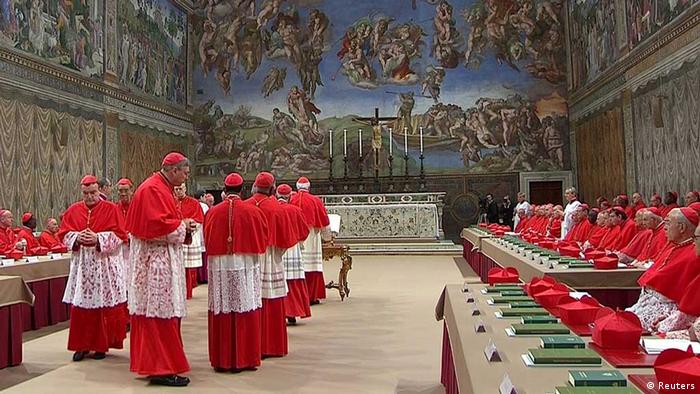Catholic cardinals have been locked into the Sistine Chapel for their secluded assembly to elect a new pope. A total of 115 cardinals from 48 countries are likely to hold just one ballot Tuesday.
The 115 scarlet-robed cardinals on Tuesday were locked in the Sistine Chapel at 5:34 pm local time (1634 GMT) to start their historic conclave to elect a new pope after Benedict XVI's surprise resignation.
All eyes are now on the Sistine Chapel's chimney, as its smoke will reveal whether or not a new pope has been chosen.
After each round of voting the ballots are burned and if the vote is inconclusive chemicals are added to the paper to blacken the smoke. If a decision is reached the smoke emerging from the chimney will be white.
Ancient tradition
Once the cardinals had filed into the Sistine Chapel, the master of ceremonies Guido Marini invoked the "Extra Omnes," (Latin for "Everyone Out") and all non-voting people present left the chapel before the doors were locked.
The cardinals are likely to hold just one ballot on the first day and up to four on the following days.
Earlier Tuesday, the cardinals held a mass in Saint Peter's Basilica where they prayed for the unity of the Church.
A total of 115 cardinals from 48 countries - all under the age of 80 - are taking part in the elaborate ritual, which continues until one of them receives a two-thirds majority, or 77 votes, necessary to become the 266th pope.
The cardinals have taken an oath of secrecy and will be banned from communicating with the outside world, remaining secluded until the new pope has been elected.
Benedict XVI, who abdicated last month, was elected in less than 24 hours in 2005. However, his predecessor, John Paul II, was chosen after three days. The average length of the last nine conclaves was just over three days and none went on for more than five days.
No clear frontrunner has emerged since Benedict announced that he intended to step down, becoming the first pope since medieval times to do so.
hc/kms (Reuters, AFP, AP) dw de


No comments:
Post a Comment